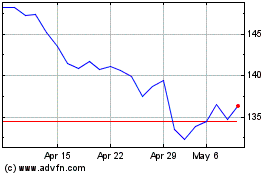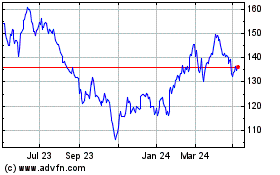By Trefor Moss
HONG KONG -- Volkswagen AG said Monday it would postpone
production restarts at some of its Chinese plants until next week,
while the organizers of China's biggest car show said the event
would not go ahead in April as planned, as the outbreak of a new
coronavirus continued to weigh on the world's biggest automotive
market.
Volkswagen's delay, by an additional week until Feb. 24,
highlights the difficulties that companies are facing amid the
virus epidemic. The German auto giant, which has extended Lunar New
Year holidays at its plants, blamed "national supply chain and
logistics challenges as well as limited travel options for
production employees."
Volkswagen, which operates 33 plants in various locations in
China away from the outbreak's epicenter, ceased production on Jan.
23. Some of its plants have already resumed production.
The virus, which causes an acute respiratory illness called
Covid-19, has killed 1,770 in mainland China and infected more than
70,000. The outbreak is further denting growth in an economy that
was already slowing.
The quarantine of nearly 60 million people in Wuhan and
surrounding Hubei province, the center of the epidemic, means that
workers who visited family in the region over the Lunar New Year
holiday can't get back to their jobs.
On top of that, many Chinese cities, including Beijing, the
capital, and Shanghai, its main financial center, are asking most
people entering from elsewhere to quarantine themselves at home for
14 days before going to work.
In a trade group survey of 109 companies with manufacturing
operations in Shanghai and nearby areas that was released Monday,
41% said a lack of staff is their biggest challenge over the next
month or so, while 30% said logistical problems are their greatest
headache.
Among the respondents to the survey conducted by the American
Chamber of Commerce in Shanghai, 78% said they don't have
sufficient staff to run a full production line.
Meanwhile, Auto China, which is one of the global industry's
marquee events and draws more than 800,000 visitors, is being
postponed amid efforts to curb the virus, the organizers said
Monday. The Beijing vehicle expo was the latest among the many
business and political events to have been delayed
indefinitely.
Also at risk is the annual conclave of China's national
legislature. The National People's Congress, comprising nearly
3,000 members, typically gathers in early March to set out China's
policy agenda for the coming year. The standing committee of the
Congress will weigh plans to postpone the meeting, the state-run
Xinhua News Agency reported Monday.
In a sign of how deeply concerned the government is about the
economic fallout from the virus outbreak, President Xi Jinping
urged local authorities to step in to help revitalize sales amid
the continuing epidemic.
In remarks to the Politburo Standing Committee -- China's top
political body -- published Saturday by a Communist Party
periodical, Mr. Xi said officials should counter the economic
impact of the outbreak by supporting household consumption,
including automobile purchases.
In particular, restrictions on vehicle purchases designed to
fight traffic congestion in several of China's biggest and
wealthiest cities, including Beijing and Shanghai, should be eased,
Mr. Xi said. He made the remarks on Feb. 3, according to the
periodical, Qiushi.
Auto makers in China expect their first-quarter performance to
be decimated by the viral outbreak, with sales set to fall 40% and
production to slump by up to 60%, according to research firm
Jefferies. Only around one-fifth of car dealerships are currently
open nationally.
The unfolding catastrophe at home will only push Chinese auto
makers to double down on plans to develop new markets abroad and
limit the risk of being too dependent on domestic sales, said Jing
Yang, corporate research director at Fitch Ratings.
For years China's auto makers were largely content to ride a
decadeslong domestic boom in auto sales, but two straight years of
sputtering sales at home, a reverse compounded by the epidemic,
have added a new sense of urgency to efforts to develop foreign
sources of growth.
On Sunday, General Motors Co. said it would sell its plant in
Thailand to Chinese auto maker Great Wall Motors Co. The move comes
a month after GM said it was selling its last remaining India plant
to Great Wall, one of a group of Chinese car companies aggressively
targeting sales in overseas markets to offset tough conditions at
home.
"The global strategy of Great Wall Motors has begun to take
shape after more than 10 years of development," Liu Xiangshang,
Great Wall's vice president, said in a statement, outlining the
company's plans to use the Thai plant to produce vehicles for sale
in Southeast Asia and Australia.
Alongside Great Wall, the global push has been led by Zhejiang
Geely Holding Group Co., which owns Volvo Cars and has operations
spanning Europe and Asia; and state-run SAIC Motor Corp., which
owns another former GM plant in India as well as factories in
Southeast Asia.
GM also said it would wind down its operations in Australia and
New Zealand, moves that would complete the company's full retreat
from Asia-Pacific markets with the exception of China. The
Detroit-based company also pulled out of Europe in 2017.
"We are restructuring our international operations, focusing on
markets where we have the right strategies to drive robust
returns," Mary Barra, GM's chief executive, said in a statement.
The Thai deal will be completed by the end of this year, subject to
regulatory approval, the companies said.
--Raffaele Huang contributed to this article.
Write to Trefor Moss at Trefor.Moss@wsj.com
(END) Dow Jones Newswires
February 17, 2020 07:18 ET (12:18 GMT)
Copyright (c) 2020 Dow Jones & Company, Inc.
Volkswagen (TG:VOW)
Historical Stock Chart
From Mar 2024 to Apr 2024

Volkswagen (TG:VOW)
Historical Stock Chart
From Apr 2023 to Apr 2024
